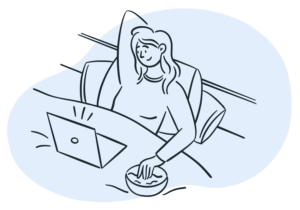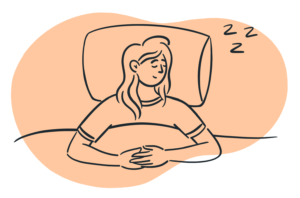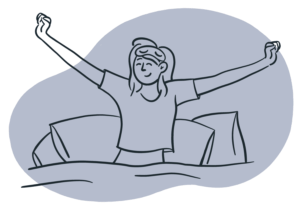Working From Home and Sleep Habits
Disclosure: By clicking on the product links in this article, Mattress Nerd may receive a commission fee at no cost to you, the reader. Read full disclosure statement.
Working from home isn’t going anywhere. More and more major companies are embracing hybrid home-and-office working models, and the majority of American workers want to stay remote after the pandemic.
If you’re fortunate enough to have the option to work from your couch, it’s vital to establish good sleep habits and work-life boundaries. That’s according to countless sleep and mental health experts, as well as a nationwide study conducted by The Mattress Nerd. The sleep experts at Nerd surveyed 2,141 people—94 percent remote workers—about their sleep habits in order to get a pulse on how the WFH lifestyle affects sleep quality. The vast majority of participants—about 85 percent—report working from home three to five days a week.
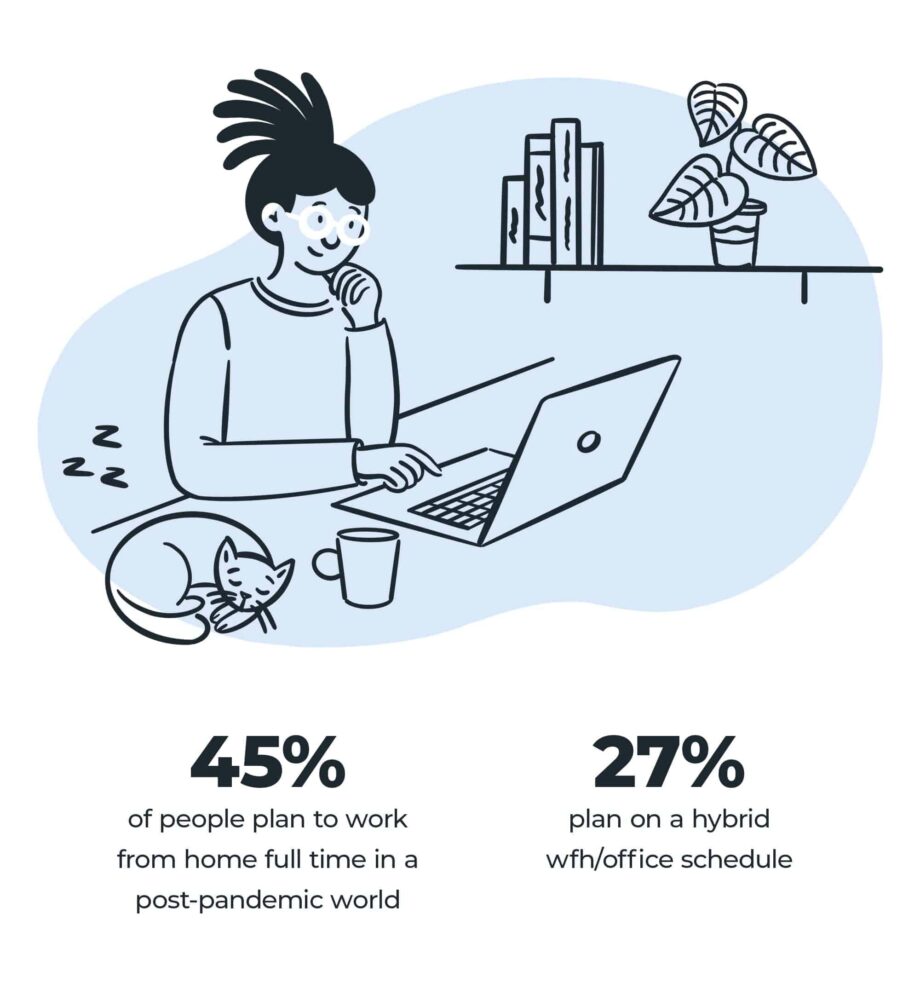
When asked about the importance of sleep for productivity at work, they gave sleep an average impact score of 7/10 (with one being minimal impact and 10 being severe impact). This echoes research about the importance of sleep for positive outcomes at work, but 59 percent of participants say they only get six or less hours of sleep per night—a few hours short of the recommended seven to nine hours for working aged adults. Knowing how working from home impacts sleep is the first step to staying on top of your sleep health.
The Effects of Working From Home
If you’ve spent any time working from home, you’re likely familiar with the ways it can blur the line between work and the rest of life. Whether you’re fielding your child’s questions about schoolwork or fixing a faulty WiFi connection, distractions at home are one of many ways that WFH can increase our stress levels. It can also make “turning off” a lot more difficult. “This may look like starting work earlier, staying at work later, and working on ‘off’ hours such as the weekend,” says Laura Rippeon, LCSW and owner of Calm Waters Counseling. “These things can lead to increased stress, anxiety, and burnout. Sleep patterns may start to change—such as sleeping in later—because you don’t feel rested or are taking naps during the day.”
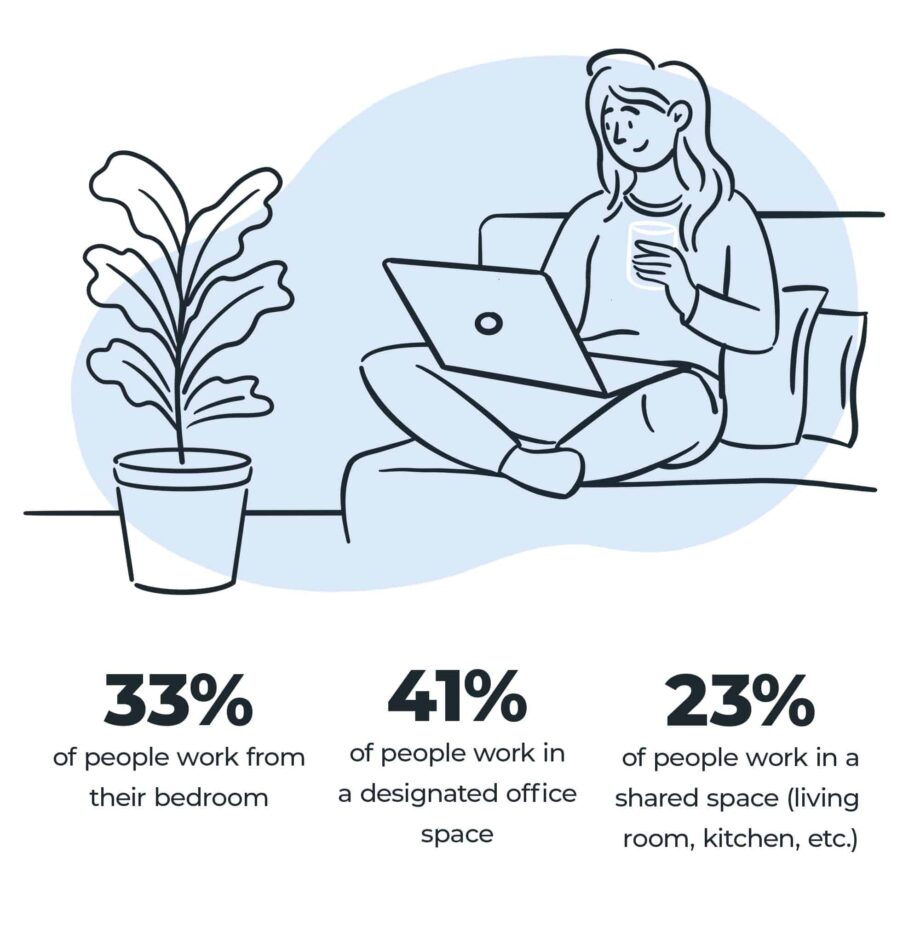
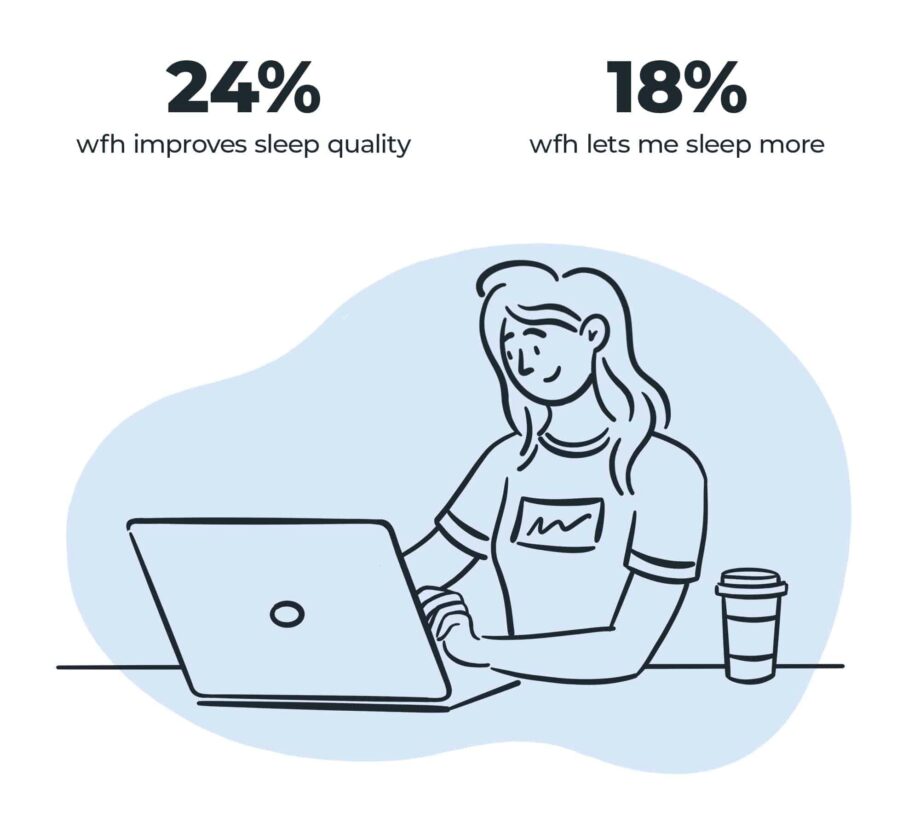
Other WFH stressors include chronic loneliness, sharing small spaces with working partners or roommates, and a shrinking work-life balance. “For many of us, our home is a literal safe space where we go to recharge and find refuge,” says Saba Lurie, Licensed Marriage and Family Therapist, “and bringing our workplace stress back home can feel like a violation of that space.”
The Impact of Working From Your Bedroom
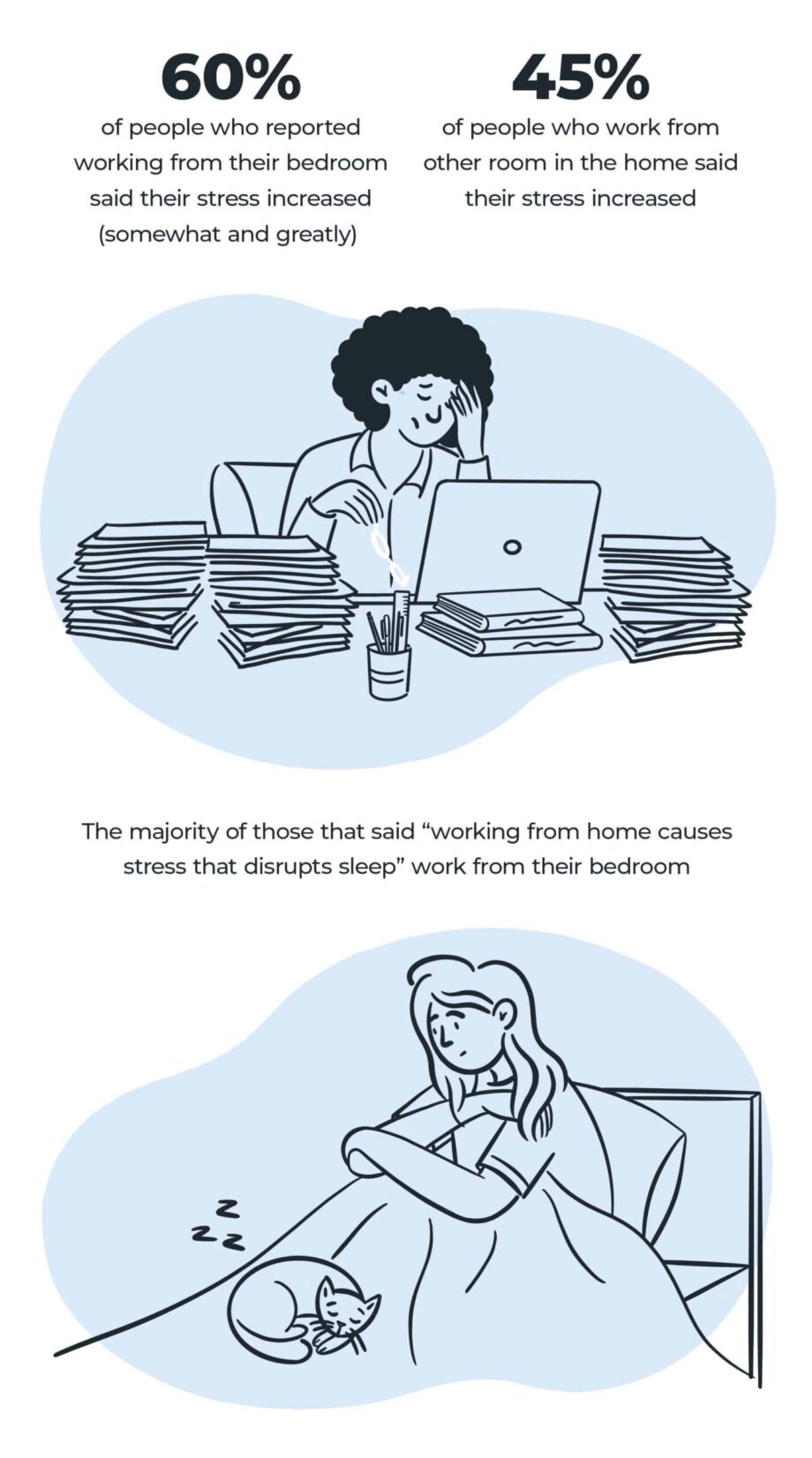
It makes sense that many remote workers find peace and quiet working from their bedrooms, but your bed is one of the worst places to post up. “Our brain often creates associations with our environment, and may begin to associate your bed with productivity and work,” says Sara Makin, a Licensed Professional Counselor. In other words, working on your bed or in your bedroom can cause your mind to return to work mode when it’s time to sleep. It also increases the amount of blue light in your sleep space, which has been linked to disrupted sleep. In Nerd’s WFH survey, 33 percent of participants reported working from their bedroom. Of those, 60 percent said their stress levels increased, compared with only 45 percent of those who work from other rooms in their home. Additionally, 62 percent of those who work from their bedroom report working more hours than those who work in other rooms. They’re also more likely to say that working from home causes stress that disrupts their sleep.
Sleep Habits by Industry
It’s no secret that sleep is crucial for physical health, mental health, and performance at work, and extra stress from working at home can contribute to sleep issues.
Half of the survey participants said working remotely had increased their stress levels in some capacity, but not all industries have been affected equally. Those in the education and healthcare sectors were impacted the most. 52 percent of education and finance professionals and 47 percent of healthcare workers now work more than they did pre-pandemic, and 64 percent of education professionals get six or less hours of sleep per night.
“When we’re sleep deprived we tend to have a harder time communicating, focusing, and problem solving, among other things, and this very quickly begins to impair our work,” said Dr. Lurie. “Sleep deprivation also makes us more irritable and irrational which can have disastrous results in a workplace setting.” If you work from home—especially in the aforementioned industries—stress management will play a big role in reducing the negative impact stress has on your sleep.
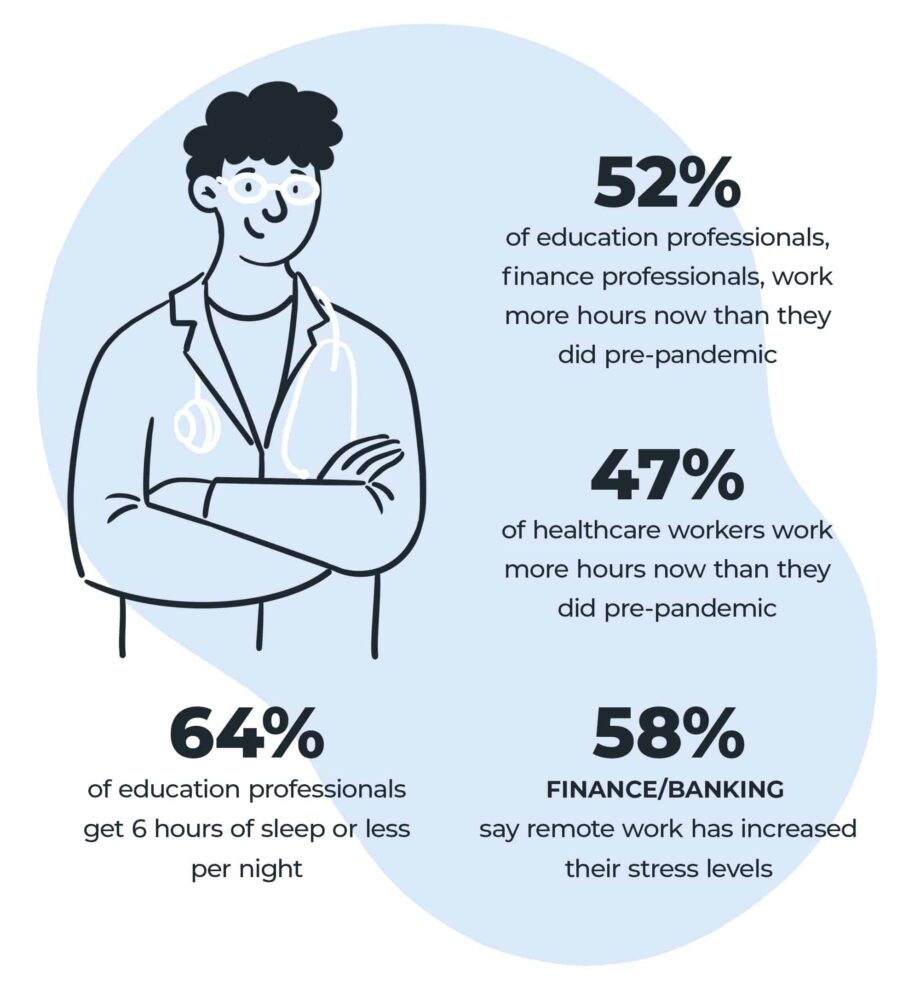
How to Combat the Negative Effects on Sleep
The best ways to protect your sleep (and sanity) involve setting work boundaries and developing routines. Here are a handful of ways to WFH and get a good night’s sleep, according to the experts.
Create A Workspace
Establish a special place in your home that you only use for work. This may not be possible for those in tight living spaces, but these folks can transform a set place at home into an office during working hours. Which leads to the next tip.
Set Work Hours
“Create a routine that tells you when your working day begins and when it ends,” says Dr. Makin. Your work day could begin when you sit down in a certain chair and end when you transition to the couch or your bedroom. The key is to be consistent about when you start and stop working each day. Try to move as many work related items as possible out of eyesight after you wrap up work.
Minimize Distractions
“If you can, try to reduce distractions such as pets, kids, television, social media, and other things,” says Dr. Makin. While it’s unlikely you’ll be able to ward off all distractions, you can minimize the ones you have control over. Turn off your phone, alternate supervising young children with your partner or spouse, and establish set times to engage with pets. Reclaiming those few minutes of distraction can amount to hours of productivity—and reduced stress—each week.
Reward Yourself
“Reward yourself for being productive,” says Dr. Makin. “If you find something is challenging to complete, break it down into smaller tasks and do something small for yourself once you complete each one.” This could look like chatting with a friend, allowing yourself to check social media, or having a snack.
Exercise
Exercising can reduce stress and alleviate insomnia, especially when done outside. Go for a walk, work in the yard, or get out of the house for an exercise class. If the weather keeps you from getting outside, you can still reduce the effect of anxiety on sleep by exercising indoors, preferably near a window with natural light. Some movement is always better than none.
Send A Signal
Choose an action or activity that signals to your brain that the workday is done. Dr. Lurie suggests closing and putting away your laptop or changing into different clothes at the end of the workday. “The more ways that you can create a mental barrier between being at work and being at home, the better,” she says, “Hopefully, you’ll find that doing this will work to significantly lower your stress and lead to much more restful sleep.”
Reflect On Your Day
Elizabeth Shabazian, Certified Peer Support Specialist at Supportiv, recommends taking a few minutes to talk about your day before winding down at night. “Simply sharing how you feel about things reduces intrusive thoughts and increases relaxation, “she says, “both of which set you up for a better night’s sleep.” If you live alone, call a friend or family member. Journaling is also a good way to process the day, although some social interaction is important for mental health.
Make Your Sleeping Space Special
Cultivate a bedroom that relaxes you. Consider reducing clutter in your bedroom, and remove any items that remind you of your to-do list. Save the T.V. for your living space, and swap out bright bulbs for warm, low-light bulbs. Invest in a comfy bed. These days you don’t even have to leave the house. You can have online mattresses or mattresses on Amazon shipped straight to your doorstep.
Final Thoughts
As more and more companies continue the WFH trend, stress management will only grow in importance. To optimize your sleep health, create physical and mental boundaries between work and rest, move your body each day, and stick to a routine.
